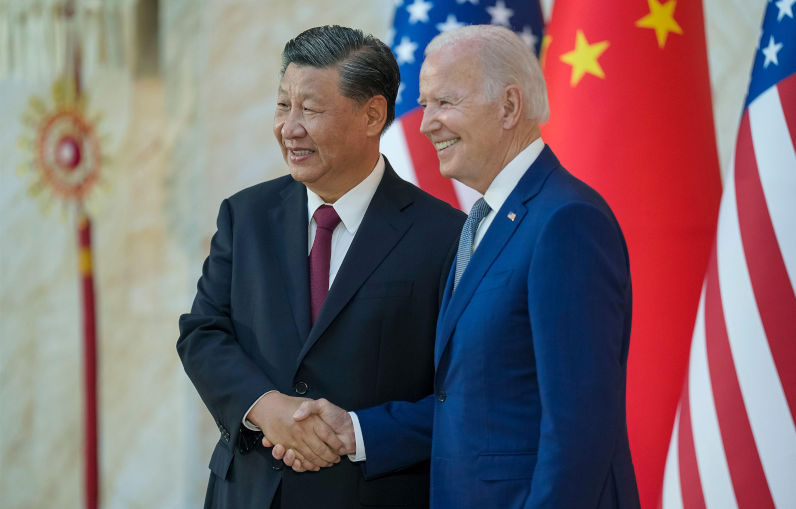- US coverage of Tsai Ing-wen’s visit has been muted as China continues to make advances in peacemaking, hi-tech, de-dollarisation and economic growth.
- Whether the Biden administration has had a change of heart about China is still uncertain but it appears Taiwan has merely been a pawn.
As US president, Joe Biden quickly instituted a hardline China policy. In the ensuing months, he became more forceful. He has called President Xi Jinping an “autocrat” and seemed bent on painting the Communist Party as some evil dictatorship that threatens the United States and the US-designed liberal world order.
On this first visit to Europe as president, Biden called on America’s democratic allies to join him in an existential struggle against the authoritarian nations of the world.
Simultaneously, he adopted pro-Taiwan policies: provocative arms sales and even hints that America might alter its long-espoused one-China policy. By October, it was clear the US had declared a tech war on China.
He backed that up by appropriating billions of dollars in funds to enable the US to better compete against China’s technological prowess. He pushed negotiations with the Netherlands and Japan (two producers of high-grade computer chips) to upgrade sanctions against China. It escalated from there. Biden also sought to enlarge the “alliance” of democracies against China.
Then it seemed the Biden administration changed course or, at least, it moderated its China stance. Last November, Taiwan held midterm elections that saw President Tsai Ing-wen’s party rebuffed by the electorate. Voters saw her as engaged in an unnecessary war of words with Beijing. They did not want a war. Biden did not appear to offer Tsai much in the way of sympathy or support.
Soon after, Biden met President Xi Jinping at the G20 summit in Bali and spoke to him in friendly – possibly even conciliatory – terms as if he wanted to dampen the feud between their countries. This alarmed Taiwan’s residents.
Then, the Biden administration pressured Taiwan into approving a billion-dollar investment for a chip plant in Arizona to slow America’s decline in producing chips. This dented Tsai’s strategy of maintaining a “silicon shield” against mainland China. (Taiwan Semiconductor Manufacturing Company owns a big share of the global production of top-of-the line chips.) Some in Taiwan felt betrayed.
Meanwhile, Beijing got Saudi Arabia and Iran together to negotiate a peace deal – something the US had failed to do. Beijing has even offered its services to broker a deal to end the war in Ukraine.
Using another diplomatic tool, its potent financial power, Beijing is making a push for the yuan to serve as an international currency. Saudi Arabia, in agreeing to consider being paid in yuan, could end a long-standing arrangement to mainly use dollars in its oil transactions. This could portend an end to the petrodollar and America’s dominant role in global trade.
Just recently, Tsai’s visit to the US was given low-key treatment by the authorities. The US media complied. Tsai cooperated. One might hazard a guess that the Biden administration is starting to realise the US struggle against China has not produced the hoped-for results, nor will it ever.
Most European countries still want to maintain important financial and trade ties with China. They do not appear to be helping Ukraine as much as Biden might have expected. If anything, Biden is likely to be displeased about the US bearing so much of the burden.
Nor has the administration’s investments to shore up America’s technology proven effective. Studies have shown that China is catching up with the US and is even ahead in critical technologies and research areas. China has the advantage in adopting technology owing to its more efficient political system. It also produces more STEM PhD graduates – those who study science, technology, engineering or mathematics – a talent pool that is set to continue strong growth.
The kicker is the projection of economic growth in the US and China. The Economist Intelligence Unit expects America’s gross domestic product to grow by 0.3 per cent this year while China’s is set to reach 5.7 per cent. The International Monetary Fund also expects US growth to lag far behind China’s.
Finally, China recently held its all-important “two sessions” political meetings, signalling plans to dramatically revise its economic development strategy and play a bigger role in rebuilding the world order – one based on its strengths in finance and technology. One might have expected a quick and robust US reaction. There wasn’t.
Is Biden’s struggle against China a mistake? Arguably, it has hurt the US more than China. Despite talk of Biden sanctioning commerce with China, bilateral trade has grown. Whether there has been a change of heart by the Biden administration about China is still uncertain. In any case, it appears Taiwan has merely been a pawn.
First published in South China Morning Post April 12, 2023
John F. Copper
John F. Copper is the Stanley J. Buckman Professor (emeritus) of International Studies at Rhodes College in Memphis, Tennessee. He is the author of more than forty books on China, Taiwan, and U.S. Asia policy. His most recent book Taiwan’s Presidents: Profiles of the Majestic Six was published August 2024.
